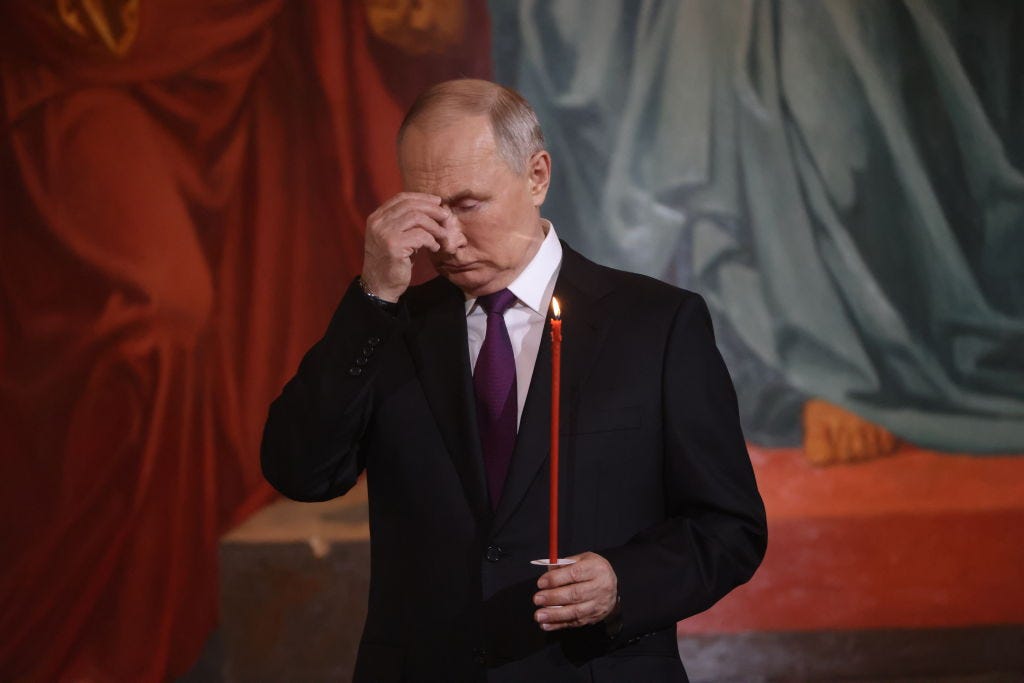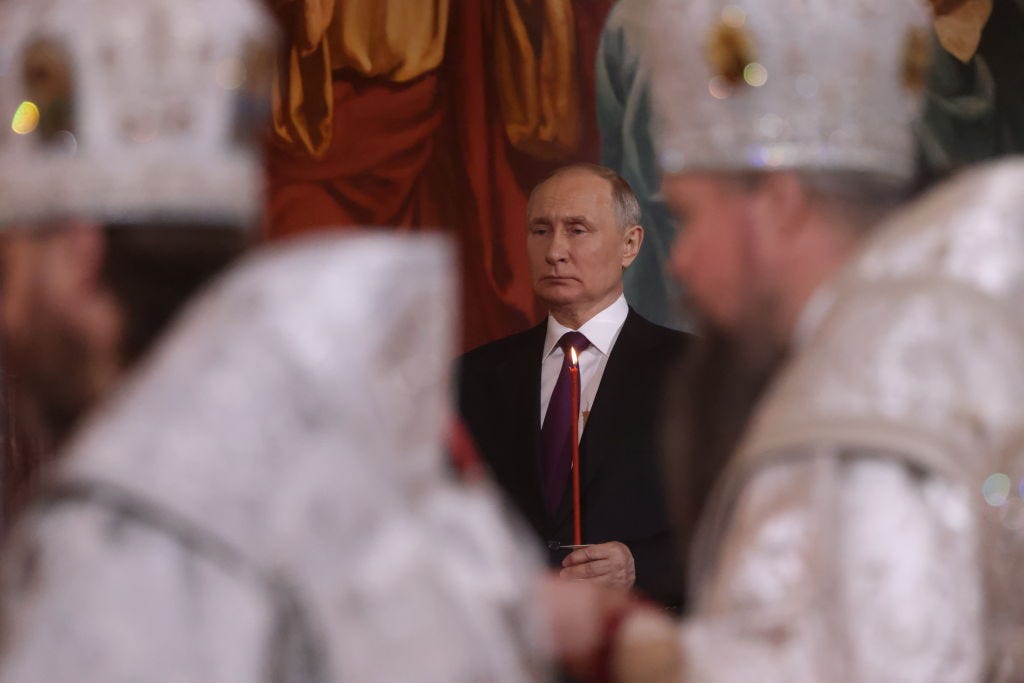Tech Superpowers: Russia
Crosses to bear
About a decade ago, I decided the most burning issue in the world concerned “the frontier of the rule of law” — an arc of uncertainty and possible conflict running from somewhere in the marshes of Southern Iraq up through the Caucasus and terminating in the general vicinity of Minsk. I applied along these lines to join the comparative government program at Georgetown’s Graduate School of Government, got in, attended a political theory seminar over the summer hosted by an outside institution, and switched my major to political theory a week or so after classes began.
Not a situation I begrudge, to say the least, but it would be funny how things come around were it not, along that bloody arc, so concussively sad. Any Christian, but especially Orthodox, must recoil in prayerful horror at the outrageous monstrosity on display in the mutual slaughter of hundreds of thousands of Orthodox brothers over what, at least on the surface, appears to be little more than a largish strip of land.
But one of the crosses that Russians and Ukrainians must bear is that it is not just a strip of land; it is “the frontier of the rule of law”, by which we now must mean the bleeding edge of what Jean Baudrillard would call the ingestion or integration of the West’s final hinterland into the artificial world the hegemonic order of globalization imposes.
Going back and reading Baudrillard’s final essays, first published at that same moment in time as my initial ambitions to become a professional expert in “the frontier of the rule of law”, it is galling to see how his damning diagnosis of the global hegemony now acting out his script has been largely abandoned by “the Left”, and all such criticism is now coded and interpreted by the hegemonic regime as “dissident Right” or some such.
Baudrillard was, of course, operating at a level of analysis far above political Left and Right. In the end, his prophetic warnings about the inevitable, inexorable self-transformation of the cult of revolutionary freedom into a system of compulsory liberation carried a call of responsibility not to succumb to the cyborg theocracy. The monstrosity he observed rising to power now propagandizes spiritual resistance against that transformation as the quintessence of “far-right extremism” — of violence, crime, and treason — and while this is naturally a problem for Americans caught out reeling from the suddenness of this dark revelation, it is arguably even more so a problem for Vladimir Putin, and for the civilization-state he has so far beat the odds in rebuilding from the ruins left behind by the rapacious financiers of the post-Cold War West.
Bittersweet Symphony
As I suggested above, no serious Orthodox, even in Russia, can look upon Putin or his works with unalloyed favor. Even here, even now, even with Putin’s church visits complete with the sign of the Cross, politics and the State are always fraught with corruption and sin, and with the overwhelming force of “perfect excuses” power makes for itself when the defense of the realm, the people, the faith are concerned.
In fact this is nothing new whatsoever for the Russian Orthodox Church, which for centuries has suffered in and because of its faith with a nightmarish intensity so far beyond American imagination. In the darkest times of the twentieth century, the Church was, it is fair to say from a quotidian point of view, almost entirely obliterated — not by corrupt incorporation into the power of State, but by martyrdom at the hands of Communism’s agents of compulsory liberation.
Whereas now — shockingly, to people unaware of how the triumph of digital throws all civilization-states seeking sovereignty over their technology back onto their original faith — the Church has ascended to heights unimaginable a generation ago, however precarious and perilous. Even the ideal Orthodox condition of symphonia or harmony between Church and State — in stark and crucial contrast to both main Western alternatives, “wall of separation” on the one hand and theocracy on the other — there is no escaping the tension in this relationship, nor the temptation on the part of the Church to more fully and firmly restore its fortunes by flattering the prerogatives of the powerful.
Yet there is good reason some today claim it’s more accurate to say Moscow must get the approval of the Church than the other way around, despite deep divisions among at least some significant clergy when it comes to the State’s pressure to bless, or at least publicly support, the war with Ukraine. The difficulty is simple — this is not a “usual” war, not one driven by the traditional logic of domination which Baudrillard contrasts so effectively with that of hegemony. The purpose of this conflict really isn’t to seize x amount of land or people, resources or wealth, technology or weaponry. And that’s not because of how spiritual whomever in the Moscow regime might be.
It’s because the West really has done as Baudrillard diagnosed, seeking to overcome all domination by enforcing a closed system of compulsory liberation, one in which all must be complicit as stakeholders in the replacement of our given life and world with an automated, artificial version, wherein the most infinitesimal traces of injustice must be hunted down and expunged. Baudrillard describes this as a monstrous totalitarianism of the good, or of what we would call “doing good”, and while it is difficult to square his invocation of a helpfully counteractive “intelligence of evil” with Christian theology, it is not hard at all to see, in his picture of a cyborg theocracy worshipping good and not God, the regime of the Antichrist.
Sympathy for the Katechon
For the uninitiated, there’s a lot of talk — increasing today for the obvious reasons indicated above — about the katechon, a somewhat mysterious or opaque entity understood broadly in Christian theology to be a political or regime “restrainer” against the inevitable advent of the Antichrist, who might not take over the entire world but, I think it’s fair to say, rules in the name of the world, rules under the sign of maximalizing worldness and goodness in the intended utter absence of the triune God. As Russia continues to be thought of in influential Orthodox circles as the Third Rome, following those of Rome itself and Constantinople, the possibility of Russia being or spiritually inheriting the katechetic authority and function from Byzantium is gaining consideration.
But it would be a mistake to think of the katechon as being simply the most virtuous or felicitous regime. It is in the odd and mystical position of being a prolongation of the time of forgiveness that nevertheless must not succumb to the temptation of trying to forestall indefinitely the time of judgment. It seems likely this is best understood as a particular cross to bear — not that it will be all that different in how it must be borne relative to all our respective crosses to bear.
To be concrete about it, although Russia is definitively stronger and healthier than when Putin took the reins, the situation is extremely difficult: Putin himself, though always in better health than the Western press suggests, is at this point just getting old, with no clear hint of an heir. His actually quite conflict-averse or conservative approach, while successful, is running out of runway; his description of Russians as conflict-averse conservative people who just want enough breathing room to get normal healthy life back up on its feet isn’t as wrong as it is incomplete, editing out the element that’s dissatisfied and wants a much more aggressive approach. It’s not clear he could get away with a simple armistice now, not without paying a domestic price. Portraying the war as a spiritual battle against the cyborg theocratic West was likely a choice influenced by propagandistic calculations, but the truth within has a life of its own, and brokering a middle-ground peace is a kind of spiritual retreat many Russians will find it difficult to accept. It’s hard out there for a katechon.
Nor is the spiritual scene itself as stable as might be desired in Russia. Cosmists, gnostic heretics knocking around for over a hundred years, would love nothing more than to prove that they, not the West, will become the true cyborg superheroes engineering universal consciousness. Muslims have been around in Russia for centuries — Westerners searching in vain for a successful multi-ethnic and multi-religious empire need look no further than Russia — but the trajectory of Islam in Russia is an increasingly sore point: Russians, whether Orthodox or secular, have reason for discomfort with the kind of aggressive Islamization unfolding in Europe as well as with the Abrahamic-Family-House approach to egalitarian ecumenicism. Meanwhile Alexander Dugin, seen as a nutcase in the West, is carefully trying to theorize an eschatological political theology that manages to bring back into harmony the various factions or strains of Russian Orthodoxy, of which there still are several.
It all suggests that, while Russia has a huge leg up relative to other civilization-states in drawing on its original religious resources to assert spiritual authority over the technology within its control, geopolitical, interreligious, and apocalypticist trends are pressuring Russians in two ways: first, to succumb to the temptation to take more aggressive action in the world against the hegemonized West; and, second, to race toward a kind of spiritual renewal that often takes a very long time even under ideal conditions. A growing share of Russians, especially younger men, will hope that both these difficult courses can be speedrun simultaneously — an understandable longing, of course, and perhaps even necessary, but one immensely susceptible to the catastrophic sin of pride.






I have a deep personal and emotional connection with Russian culture and the Russian people for more than 30 years now, and usually find most of western views from so-called experts quite non relevant.
This piece is different and stands out. Thankfully.
"Baudrillard’s final essays" -- Which book are you referring to? Or, where may these essays be found?